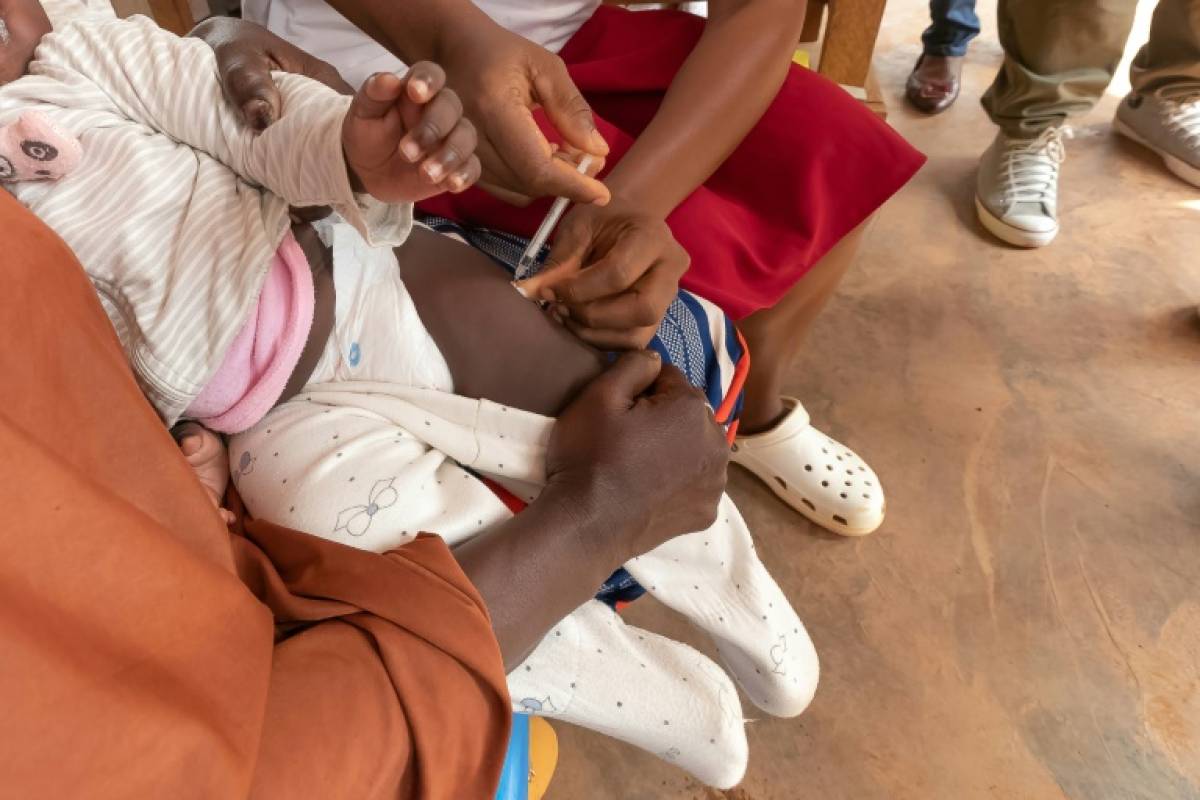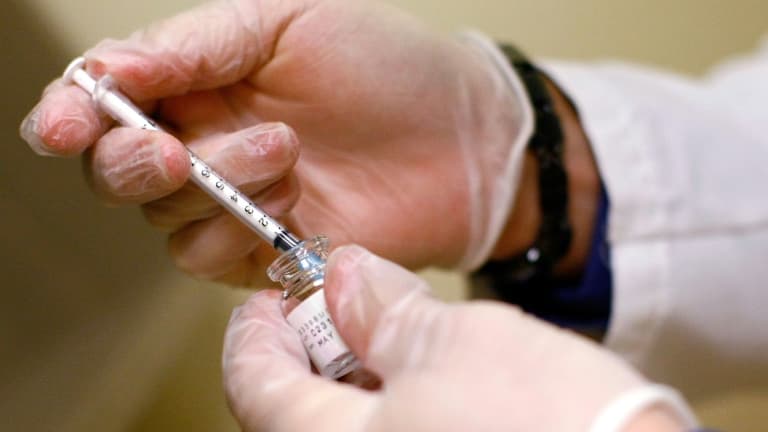Cameroon launches world’s first systematic vaccination against malaria – 01/22/2024 at 6:53 pm.

A child receives a malaria vaccine injection at a hospital in Soa, Cameroon on January 22, 2024 (AFP / ETIENNE NSOM)
Cameroon on Monday launched the world’s first systematic and large-scale vaccination campaign against malaria, a “historic step” according to the WHO in the fight against the deadliest disease among African children.
Noah Ngah, a six-month-old infant, received his first injection of the RTS,S vaccine, one of numerous vaccinations, to the cheers and chants of nurses at a small hospital in the town of Soa, 20 km from the capital Yaoundé. Centers in 42 districts have been declared “priorities” by the government of this vast Central African country of about 28 million inhabitants.
A relief for Noah’s mother, Helen Akono, who then waits for his twin sister, Judith. “Some parents are reluctant but I know vaccines are good for children,” she explained to AFP.
– A child dies every minute –
Malaria, also called malaria, is transmitted to humans through the bites of certain types of mosquitoes. It kills more than 600,000 people every year, 95% of them in Africa, according to the World Health Organization (WHO).
Noah Ngah (l), the first infant to receive a malaria vaccine, and his twin sister, Judith Ndzi, at a hospital in Soa, Cameroon on January 22, 2024 (AFP / ETIENNE NSOM)
And on the continent, children under the age of five account for more than 80% of deaths.
More than 300,000 doses of the RTS,S anti-malaria vaccine from British pharmaceutical group GSK, the first approved and recommended by the WHO, were delivered to Cameroon on 21 November.
The initial planning of the campaign took two months, during which, according to the government, malaria injections were systematically given to all children under six months of age, free of charge, just like other traditional vaccines.
RTS,S has been tested since 2019 in “pilot programs” in a limited number of locations in three African countries, Kenya, Ghana and Malawi.
In Ghana, Health Minister Kwaku Agyeman-Manu noted that vaccination has had a significant impact in reducing malaria-related mortality among under-fives, from 1.7% in 2008 to 0.06% in 2022.
“It is not only profitable, it is also a very effective way of ensuring the survival of children,” he assured AFP.
The launch in Cameroon of the world’s first large-scale and “systematic” vaccination campaign, according to WHO, which is coordinating it, is financed exclusively by the Gavi Vaccine Alliance.
The pilot program resulted in “a stunning 13% reduction in all-cause mortality among children old enough to receive the vaccine, as well as significant reductions in severe forms of malaria and hospitalizations,” the WHO concluded in November.
Aurélia Nguyen, Gavi Program Director, in Geneva, January 18, 2024 (AFP / Elodie LE MAOU)
Cameroon “is the first country in the world to introduce direct vaccination against malaria”, enthused Aurelia Nguyen, director of GAVI programs in Geneva (Switzerland).
In Africa, “a child under 5 years old dies of malaria almost every minute”, underlines the WHO, which on Monday welcomed the “introduction” of “essential” and “routine” vaccination programs in the country at risk.
After receiving 1.7 million doses of RTS,S, the next countries to begin mass vaccination in the coming days or weeks are Burkina Faso, Liberia, Niger and Sierra Leone, the WHO specified.
“The large-scale implementation of anti-malaria vaccination” is “a historic step” that “could be a game-changer in the fight against malaria and save thousands of lives every year”, the WHO estimated at the end of November.
– Safety –
The question of vaccine acceptance by the population remains.
Mothers and their children at Soa Hospital during the launch of the first vaccination campaign against malaria in Cameroon on January 22, 2024 (AFP / ETIENNE NSOM)
Data from pilot projects in Kenya, Ghana and Malawi “demonstrated the safety and efficacy of the RTS,S vaccine” and “provided evidence on the acceptance and uptake of the vaccine” by the population, which allowed the WHO to make another recommendation on October 2. 2023, “R21, produced by Serum Institute of India (SII)”, writes WHO.
Special Adviser to the Kenyan Committee of the Global and Malaria Fund, co-chaired by Bill Gates, Dr. “Malaria is such a killer that the population concerned has largely accepted it,” assures Willis Akhwale. “It is not yet the expected miracle solution (…) but even with an effectiveness of 40%, it saves lives.”
From the Cameroonian hospital, Dr Alma Mpiki is also optimistic: “I have seen parents who are hesitant, especially from Covid-19, and the vaccination campaign against cervical cancer, but I believe in the future”, she argues, convincingly. “People will be more willing to vaccinate their children” by “seeing the effect”.





